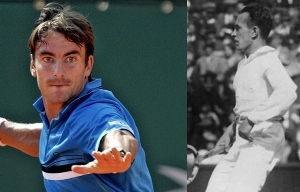 By Randy Walker, @TennisPublisher
By Randy Walker, @TennisPublisher
The name Henri Cochet surfaced on television and in media reports at the French Open as Tommy Robredo became the first player since Cochet in 1927 at Wimbledon to win three consecutive matches from two-sets-to-love down. Robredo’s 6-7 (7-9), 3-6, 6-4, 6-4, 6-4 fourth-round win over fellow Spaniard Nicolas Almagro came after the No. 34-ranked player also needed five sets to overcome Dutchman Igor Sijsling in the second round and Gael Monfils in the third round.
Cochet, one of the famous four Musketeers immortalized on the grounds at Roland Garros, won his three straight matches in the quarterfinals, semifinals and final of Wimbledon in 1927. But, as 1931 Wimbledon champion Sidney Wood documents in his book THE WIMBLEDON FINAL THAT NEVER WAS…AND OTHER TENNIS TALES FROM A BYGONE ERA, Cochet should have actually lost the final-round match with fellow Musketeer Jean Borotra, if not for a controversial “non-call.”
Wood’s front row personal observation of the controversial conclusion to the 1927 Wimbledon final – Cochet’s third straight 0-2 comeback win – is documented in the excerpt below here in his 2011 post-humously publisher memoir, that is available for sale here:http://www.amazon.com/dp/
Jean Borotra, one of France’s multiple-winning Davis Cup “Four Musketeers,” is on record as having garnered two Wimbledon men’s singles titles. But had the umpire found the
courage to immediately make the right call on a match-point, a double hit by fellow Musketeer Henri Cochet in the 1927 Wimbledon final, Jean would have owned his third win.
It was my first visit to Wimbledon (I lost in the first round to René Lacoste) and I’d managed my way into a first row center seat behind the umpire’s stand for the final, where from about twenty feet, I could see and hear everything that went on during the court changes. I’ve never really been fraternally comfortable about relating the unsportsmanlike hard facts of a quite incredible experience. But when my friend Alan Little, who has made Wimbledon’s matchless library our game’s one-of- a-kind repository for every tennis book and major magazine published, exhumed for me the name of Ashley Tinnen, the match’s umpire, from his musty archives, I decided the story should not be omitted from this compilation.
In a rapid-fire volleying exchange at 5-4 and match point in the fifth set for Borotra, Cochet’s racquet made an audible frame-contact, followed by a stabbed touch of the ball for a Jean Borotra mis-hit ‘’winner.” I witnessed and clearly heard the double hit, but possibly it was not that obvious to the non-player press corps seated at courtside but further from the net. Then, instead of an immediate “game, set and match, Borotra” announcement, with Jean waiting expectantly for his Cup teammate to congratulate him, there ensued an embarrassed momentary pause until in these still remembered, exact words from Tinnen, “Monsieur Cochet, did you perchance smite the ball more than once?”
With Gallic-shoulders shrug to indicate he was aware of nothing untoward, Henri was silent. Jean, who was everywhere recognized as the game’s consummate sportsman, somehow wouldn’t bring himself to protest, and Cochet escaped to win three games later his first of two Wimbledon men’s singles titles.
I so much wanted to believe Henri wasn’t really sure about his double-hit but could never really convince myself. In France, Henri was everyone’s “The King.” A year later, I became Cochet’s practice mate and fractured-French interpreter prior to his winning our U.S. Nationals.
Cochet, who won a record nine French Open titles (five in singles, three in doubles and two in mixed) was also profiled by Wood in his book, as seen in this article, also from WorldTennisMagazine.com: http://www.
